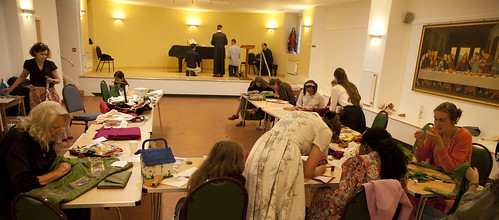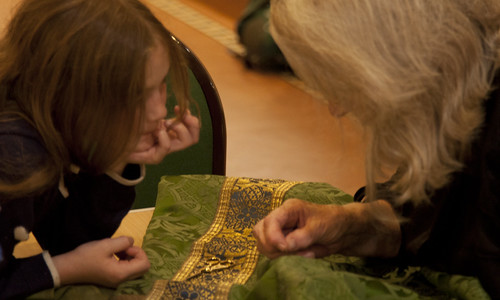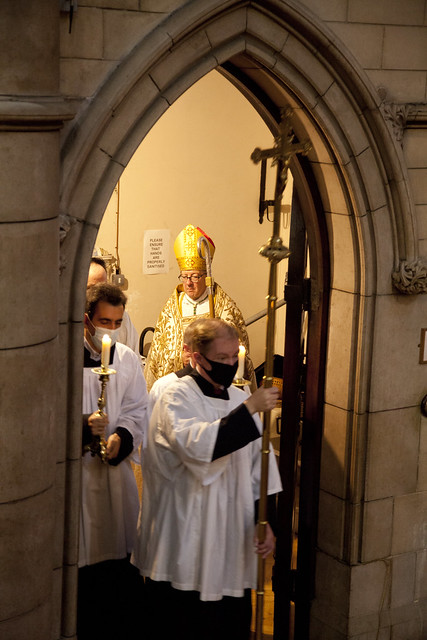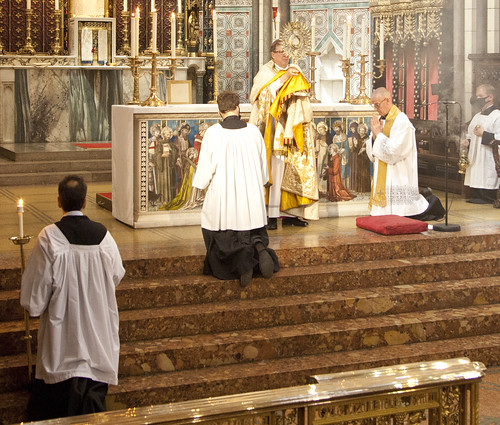Chairman's Blog
'After Traditionis Custodes': Podcast
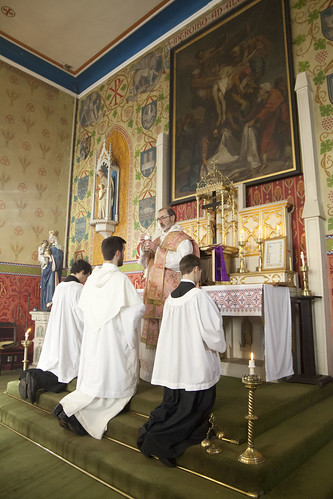 |
| Dominican Rite Mass in Holy Trinity, Hethe, 2019 |
Today we launch a new season of our Iota Unum podcasts, to publish weekly.
German Professor criticises Traditionis Custodes
My latest on LifeSite.
Professor Helmut Hoping, Professor of Dogmatics and Liturgical Studies at the University of Freiburg, has written a strongly critical article on Pope Francis’s Apostolic Letter Traditionis Custodes, in the respected German newspaper, Frankfurter Allgemeine Zeitung (FAZ) on July 28. The article, in German, is unfortunately paywalled, but I have seen a translation.
Pope Francis claims in Traditionis Custodes that the reformed, post Vatican II Missal is the “only expression of the lex orandi of the Roman Missal” (not, as the official English translation had it, merely the “unique” expression). Hoping points out that in 2015 Pope Francis promulgated the Missal of the Anglican Ordinariates, Divine Worship, which describes itself as a “legitimate adaptation” of the Roman Rite, and that only last year, the Congregation for the Doctrine of the Faith published a decree on the Extraordinary Form, Quo Magis, which described it as a the “other form of the Roman Rite”. Somehow, between February 2020 and July 2021, the Holy See has radically transformed its understanding of what constitutes the “Roman Rite.”
Another oddity Professor Hoping points out in Traditionis Custodes is Pope Francis giving bishops the “exclusive” right to manage the celebration of the older Mass, he then commands them to “follow all the instructions of the Apostolic See,” setting out various limitations on what they may permit.
Hoping continues:
“But it may not be quite so easy to put an end to the old Mass. It is appreciated by many because it protects [worshippers] against the personal creativity with which many priests today assemble the Mass, disregarding the norms of the Missal of Paul VI and the right of the faithful to a liturgy celebrated in accordance with the applicable Roman Rite. With its evolved ritual structure, the old Mass resists attempts to de-sacralize it. This makes it attractive to believers with a sense of the holiness, beauty and objectivity of Christian worship, including, increasingly, young people. Not that the renewed liturgy could not be celebrated worthily and according to the rubrics. However, it is often difficult to perceive, in parish Masses, their character as a sacred act (actio sacra). It was the promotion of this idea which was the object of the liturgical reform, which found its first expression in the Missal of Paul VI (1970).”
Read the whole thing there.
Ruff and Shaw on Traditionis Custodes and the Reform
"The question of whether it’s appropriate for the Church to prohibit the previous rite is identical to the question of whether Vatican II’s statements on the liturgy are legitimate and correct – and I think they are."
"He [Pope Francis] did not say that the 1962 Missal has no lex orandi, or is opposed to the Church’s lex orandi. The 1962 Missal reflects the Roman rite’s lex orandi to the extent that it reflects the Church’s liturgy as found in the 1970 Missal.""the primary argument of TC is not a pragmatic one about whether or not traditionalist communities are guilty of the vices Pope Francis names. Even if traditionalist communities are coexisting in perfect peace with the rest of the church, Francis’s primary argument is that their liturgical practice is not in line with the Church’s intentions."
The substance of the ancient doctrine of the deposit of faith is one thing, and the way in which it is presented is another. And it is the latter that must be taken into great consideration with patience if necessary, everything being measured in the forms and proportions of a magisterium which is predominantly pastoral in character.
A reply to JD Flynn's attack on Cardinal Burke
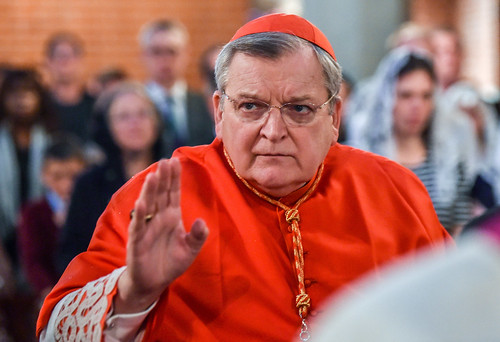 |
| Cardinal Raymond Burke in London, celebrating Mass for the Latin Mass Society in Corpus Christi, Maiden Lane 2019 (photograph by John Aron). |
Cross-posted from Rorate Caeli.
In the Pillar, JD Flynn criticises ‘the siren voices calling for disobedience, or casting into doubt the authority of the Vicar of Christ’. He has earlier quoted Cardinal Raymond Burke, Bishop Athanasius Schneider, and Bishop Robertus Mutsaerts, but he leaves it to his readers to connect what he quotes them as saying with ‘calls for disobedience’ and ‘casting into doubt the authority of the Vicar of Christ’. This seems on the face of it a serious injustice, and a failure to give these individuals the respect due to their office and indeed to every Catholic, who has a right to his good name: see Canon 220.
For readers such as myself to be expected to examine the quoted remarks and look for possible support of these serious allegations is ridiculous and an invitation to uncharity. Flynn does not even give us a clue which of the three is implicated in these two alleged offences. Indeed, it might even be that Flynn would, if challenged, refer us instead to the unnamed others he vaguely refers to in the course of the article. However, the insinuation remains, it is serious, and it should be withdrawn.
To illustrate, a reasonable person reading this article would conclude that ‘casting into doubt the authority of the Vicar of Christ’ is a reference to the remarks quoted from Cardinal Burke in the article:
“Can the Roman Pontiff juridically abrogate the UA?” Burke asked.
The cardinal concluded in the negative, positing that the pope’s authority does not allow him “to eradicate a liturgical discipline which has been alive in the Church since the time of Pope Gregory the Great and even earlier.”
This is then linked to an interpretation of His Excellency’s remarks by a CNA author. Flynn does not express an opinion as the truth of this interpretation, and yet feels justified to make his insinuation.
In point of fact, Cardinal Burke’s remarks are not a denial of the authority of the Papacy, but a comment about what that authority means. I would be interested to know if Flynn would regard as a rejection of the authority of the Vicar of Christ these words of the then sitting Prefect of the Congregation of the Faith, one Joseph Ratzinger (The Spirit of the Liturgy (2000)):
After the Second Vatican Council, the impression arose that the pope really could do anything in liturgical matters, especially if he were acting on the mandate of an ecumenical council. … The pope’s authority is bound to the Tradition of faith, and that also applies to the liturgy. It is not “manufactured” by the authorities. Even the pope can only be a humble servant of its lawful development and abiding integrity and identity.... The authority of the pope is not unlimited; it is at the service of Sacred Tradition.
It is a commonplace among theologians that the power of the Vicar of Christ is not arbitrary or despotic, but given for a specific purpose, a purpose which conditions the matters which it governs and also the way it can be used. The Church’s own tradition of Canon law allows for the fact that some practices are simply not uprooted by legislation against them and become legitimate with the passage of time (Canon 24.2); that bishops can lift universal disciplinary obligations from those under their charge for the good of souls (Canon 87.1); and that, in the final analysis, the salvation of souls is the supreme law (Canon 1752).
The power of the Vicar of Christ must be understood within this context, and not the context of a modern, positivist conception of the law, which would make the Pope into a dictator or even a slave-master. When Cardinal Burke directs our attention to the correct context, he is doing a service to all who love and respect the Office of the Papacy.
Latin Mass: no hysteria. A reply to David Gibson
First, the pope has not prohibited priests from saying Mass in Latin
Unlike under the other points, Gibson is unable to illustrate this with any quotations or links to people saying what he alleges supporters of the Traditional Mass are saying. Perhaps someone should point out to him that these Catholics are actually acutely aware of the difference between 'banning the Traditional Mass' and 'banning the Latin Novus Ordo': rather more sensitive than he is, in fact.
“If you like the Latin Mass, you can keep the Latin Mass, because the Missal of Paul VI is the Latin Mass,” Adam Rasmussen, an adjunct professor of theology, wrote at the blog Where Peter Is.
This is aimed at John Allen in Crux, which is interesting given Allen's stature as a non-ideological journalist and the balanced nature of his article. If Allen thinks Peronism is a useful category, Gibson needs to do more than just quote Michael Sean Winters and, heaven help us, Robert Mickens, in reply.
And this is the third and perhaps biggest misconception – that Pope Francis is throttling some burgeoning traditionalist revival
Interestingly, after Summorum Pontificum there was a big surge, and this was followed by a bit of consolidation. But in the last three years the speed of growth has picked up again. Quoting a 2016 article by Mgr Charles Pope, as Gibson does, is not exactly up to the minute news, is it?
Traditionis Custodes: a disaster for interreligious dialogue and ecumenism
If [Fr Thomas] Reese [on NCR] is concerned about ecumenism and interreligious dialogue, then he is faced with a different kind of problem. Traditionis Custodes has set the Church’s relations with other religions back fifty years, and it is difficult to see how they will recover.
On interreligious dialogue, defined as discussions aimed at greater mutual understanding between the Church and non-Christian religions, the Apostolic Letter and the polemic being produced by Fr. Reese and others in its support is saying that a genuine engagement of the religious instinct is impossible through worship in a sacred language, using chant, complex ceremonies, elaborate vestments, and so on. That, as they say, is a point of view. But it is a point of view incompatible with taking seriously the search for God represented by Islam, Judaism, Hinduism, Buddhism, the Jain religion, Shamanic religions, and indeed practically any non-Christian religion you could mention. Sacred languages are found in all the major non-Christian religions — Hebrew, Sanskrit, and Classical Arabic most obviously — and sacred music, ritual, and clothing, in practically all of them.
How are Catholic interreligious dialoguers going to face their non-Christian friends the next time they meet? “It okay”, they might say. “It is only our own traditions which we fear and loath: We think yours are wonderful!” How credible is this going to be?
Keep calm and carry on: Server Training and Vestment Mending with the Latin Mass Society yesterday
The Society of St Tarcisius Server Training was also attended by a number of new people, and we enrolled a new member, who had come all the way from Bournemouth to polish up his skills. Like all members of the Society of St Tarcisius, he committed himself to serving the Altar with 'fervour, devotion, attention, and exactness.'
The Guild and the Society of St Tarcisius are both affilitated to the Latin Mass Society and their events can be found on the LMS website, and on their own: Tarcisius, Guild of St Clare. No previous experience is required for participation in the events of either! And people of all ages are welcome (children to be accompanied by an adult of course).
Their next joint event is
25th September: St James' Spanish Place, London
For the Society of St Tarcisius please see the booking page
LMS: Confirmations in London
The day after the publication of Traditionis Custodes, the Latin Mass Society-organised Confirmation service took place in St James', Spanish Place, in the Archdiocese of Westminster. For many years now--since before Summorum Pontificum, in fact--they have been providing an auxiliary bishop to give the Sacrament of Confirmation to people all over the country, and beyond. The Latin Mass Society advertises it, does the paper-work, and pays the (excellent) parish choir, so that Catholics attached to the older liturgy can receive this sacrament in that form in union with the bishops.
Thanks to Covid, the service, which usually takes place in November, did not happen in 2020, so this was a 'catch-up' one, and was smaller than usual. (This made the remaining Covid measures a lot easier to apply.) If there is demand, we'll try to organise another at the usual time of year as well.
We are very grateful to Bishop John Sherrington, who conferred the sacrament, to the parish, to the choir, and to our staff and volunteers.
Traditiones Custodes: unity vs. uniformity
In his Letter to Bishops accompanying his Apostolic Letter Traditionis Custodes, among many things worthy of comment Pope Francis says that Pope Paul VI:
“declared that the revision of the Roman Missal, carried out in the light of ancient liturgical sources, had the goal of permitting the Church to raise up, in the variety of languages, ‘a single and identical prayer,’ that expressed her unity. This unity I intend to re-establish throughout the Church of the Roman Rite.”
This is a puzzling statement. First, “the Church of the Roman Rite” has many other liturgical books besides the standard edition of the Roman Rite. Second, the standard Roman Missal contains an enormous number of options, and hardly seems to be aiming at uniformity of prayer in the sense which seems to be intended in Pope Francis’ new letter. Third, the Second Vatican Council and the subsequent Papal Magisterium teach that liturgical uniformity is not necessary to the unity of the Church, but rather that the latter is best expressed in liturgical diversity.
Canonical guidance on Traditionis Custodes from the Latin Mass Society
 |
| The 1962 Mass in the Chapel of the Throne, in St Peter's Basilica, Rome, celebrated by Bishop Rey of Frejus, France, for the Summorum Pontificum Pilgrimage 2019. |
*Traditionis Custodes does not abrogate the 1962 Missal (otherwise it could not allow it to be said in certain circumstances).
* It follows that it is not the right of priests to celebrate it that is at issue--this remains intact--but the public exercise of this right, which is a matter of regulation by the local bishop.* The right of priests to celebrate privately, to say the older Office, to celebrate the other sacraments, to use the older Rituale: all these are unrestricted by Traditionis Custodes.* The restrictions mentioned in Article 3, notably on the use of parish churches, only apply in the case of 'authorised' 'groups', such as came into existence in the course of the formal application of Summorum Pontificum, or are served by a 'personal parish'.* Although preists need permission from the bishop to celebrate the 1962 Missal, with this permission, and outside the context of a formalised 'group', he may do so without the restrictions of Art 3: for example, in a parish church.
*It would also follow that there need be no difficulty allowing the 1962 Missal to be used for special occasions such as pilgrimages.


